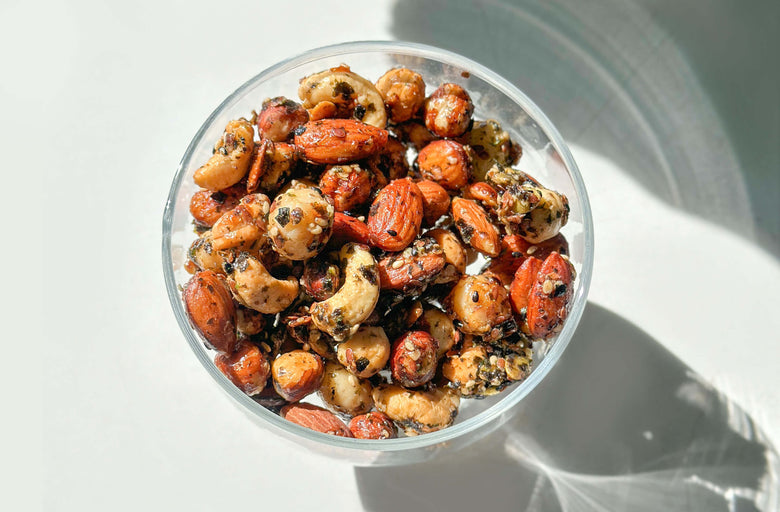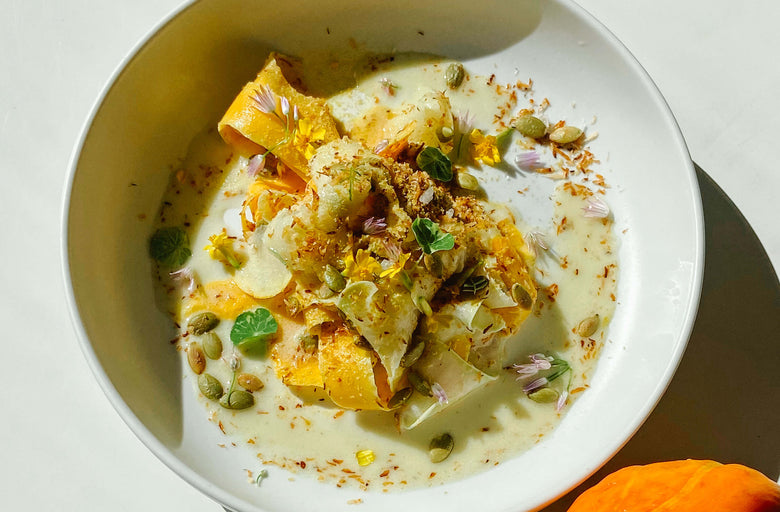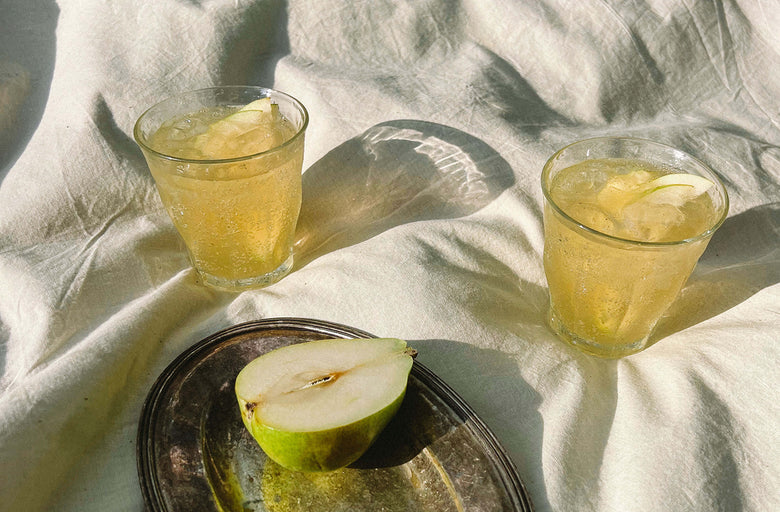It’s our mission to support you in living your healthiest life. So to ensure your immunity is in top form (and to help put your mind at ease), we gathered some wisdom from our network of expert doctors and healers—including Dr. Robin Berzin, Dr. Mark Hyman, and Dr. Aviva Romm—to assemble the best immune-boosting advice. Below is a summary of our recommendations to bolster your immune system. While especially relevant now, fortifying your body’s natural defenses through nutrition, supplements, and mindfulness is always a worthy practice.
Remember that stress compromises the immune system, so breathe and find your gratitude for all that is good. Here's to staying healthy, happy, and in the circle of love and light.
FOUNDATIONAL, ESSENTIAL NUTRITION
Eating immune-boosting greens and organic fruits and vegetables each day is the first and most important place to start to have a strong, healthy immune system. Like everything else, it all starts in your gut. In fact, a large part of your immune system lives in your GI tract. The more you can foster a healthy microbiome by eating lots of plant fiber, the happier your gut will be allowing your body to fight disease with a supercharged immune system. Aim for four to six cups of leafy greens and 12 plus servings of other vegetables and fruits. Here are a few of the foods your immunity is craving.
Broccoli offers more than just great plant fiber. A UCLA study showed sulforaphane, a compound found in broccoli, engages a set of antioxidant genes and enzymes in some immune cells that fight free radicals.
Ginger is a natural anti-inflammatory, painkiller, and diaphoretic (a compound that induces sweating). Ginger can reduce cold and flu symptoms, as well as indigestion, stomach aches, headaches, and sore throats.
Grapefruit's tart, pithy flesh is ripe with vitamins A, C, and E—a trifecta known to boost immunity. One whole grapefruit has over 70 mg of vitamin C—more than what exists in a large orange.
Millet is a super-grain; it's incredibly mineral-rich with excellent sources of phosphorus, zinc, and manganese. Zinc helps fight free radicals, regulates immunity, aids in cell turnover, and controls inflammation in the dermis.
Mushrooms have antiviral properties that help strengthen the body against viruses like cold and flu. Notably, they contain beta-glucan polysaccharides, a type of carbohydrate, which have been proven to enhance immune response.
Sweet Potato is plentiful in beta-carotene, which converts to Vitamin A in your body and is effective in eliminating damaging free radicals. This helps bolster the immune system and may even improve the aging process.

PROTECTIVE, BIOAVAILABLE SUPPLEMENTS
You have provided the proper foundation for a healthy immune system with clean greens and organic fruits and vegetables. But we all have days when we are unable to get our plant quota, so cover your bases with a 100 percent clean, plant-based daily supplement pack. It will fill in the dietary gaps you need to maintain digestive wellness and support immunity as well as energy, mood, and skin.
Vitamin D. Deficiency in this vitamin is associated with increased susceptibility to infection, and 35 percent of adults in the U.S. are clinically deficient in Vitamin D while an even greater number have insufficient levels. Aim for 5000 IU per day.
Buffered Vitamin C. Daily use of vitamin C has been shown to lower the likelihood of colds and flu, reduce antibiotic use, and reduce school absences in children. People who take vitamin C regularly can expect shorter colds (by 8 percent in adults and 14 percent in children) with slightly less severe symptoms. A 2018 meta-analysis also supports the idea that vitamin C can shorten colds and lessen symptoms. The recommended dose is 500 to 1,000 mg per day for kids and 1000 to 2000 mg per day for adults.
Zinc Citrate. A daily supplement with zinc reduces colds and flu. The dose depends on age. For adults it's 30 to 60 mg per day total. For kids over six months, the daily dose is as follows: 6 to 12 months: 2-3 mg, ages 1 to 3: 3 mg, ages 4 to 8: 5 mg; ages 9 to 13: 8 mg.
Probiotics. Up to 70 percent of the body’s immune cells reside in the gut; maintaining healthy gut flora may help prevent colds and flu when taken daily. By fortifying the gut lining, probiotics also help prevent toxic food matter from entering the bloodstream and prompting an inflammatory response—a condition known as “leaky gut” that many experts believe is the cause of autoimmune symptoms and disorders.Use a probiotic supplement that contains Lactobacillus and Bifidobacterium strains.
Plant-Based Omega. Fish get their omega-3 content by eating algae so why not go straight the source? Omega-3s strengthen immune response by balancing the ratio of omega-6 to omega-3 in the body, which directly calms chronic inflammation. This strain of algae has been researched to not only boost omega-3 in the body but also antioxidant enzyme activity and immune response.
Effective Elixirs, Tonics and Habits
With a plant-based diet and clean supplement habit, your immunity is armed and ready but there are sure to be times when you need an added boost. For extra-strength protection, try these restorative nutrients, recipes, and self-care rituals.
Quercetin is a plant flavonoid and natural antihistamine. Viruses are known to produce an inflammatory response that impairs the immune system, so this nutrient can help calm inflammation and keep the immune system healthy.
Elderberry Syrup. Rich in antioxidants and used for centuries to boost immunity. Dose is one tablespoon, three times daily for adults. Modify for children down to one-fourth of the dose ages 2 to 7 years old, and one-half the dose 8 to 12 years old; safe for pregnant women for a limited time of five to seven days. Elderberry is safe for nursing moms. Try Herb Pharm, Gaia Herbs, or Planetary Herbals.
Urban Moonshine Immune Tonic. A fantastic immune-boosting blend of Astragalus Root, Red Reishi, Codonopsis Root, Maitake, Eleuthero Root, Licorice Root, Schisandra Berry, and Ginger Root—all organic. The dose is 1/2 teaspoon once or twice a day, or up to five times daily if needed, in a little warm or cold water. It is not for use by pregnant women but it is safe if you are nursing. Dr. Aviva Romm swears by this blend during flu season.
Meditate or find a way to calm your nervous system. Excess cortisol (the hormone that spikes with increased stress) can wreak havoc on the immune system.
Work out for 30 minutes a day. Move your body until you work up a sweat.
Get enough sleep. Get at least seven to eight hours every night.
Wash your hands frequently and use hand sanitizer if you can’t get to a sink. Make your own if stores are sold out. Mix 1/3 cup pure aloe vera gel, 2/3 cup isopropyl (rubbing) alcohol, and a few drops of the essential oil of your choice. Try tea tree, which has antibacterial properties. An added benefit of the DIY version is the absence of triclosan, a common ingredient in store-bought household products that may have endocrine-disrupting effects and contribute to antibiotic resistance.
Keep company with those you love. Mental health plays a huge role in immunity.
Mind, Body, and Spirit Boosts
How to Squeeze the Most Nutrition Out of Your Diet






